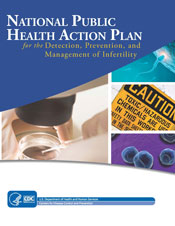BREAKING NEWS:
The Biggest Pro-Family Building Initiative of the 21st Century:
The CDC Makes Infertility a Public Health Issue
How many times have you wished there was more research going on to discover the causes of infertility, wished you could do or could have done something to prevent infertility, or wished it was easier to learn how to choose the best treatment for your particular case?
How many times have people dismissed what you’re going through, telling you to just relax, not understanding that you have a medically diagnosed disease, something that the Supreme Court has even said is a disability?
I recently read a white paper from the CDC issued in August of 2014 that describes an expansive effort to move infertility into the public spotlight as a public health issue. From what I can tell, this will help reframe the debate about infertility as a public health issue, rather than an elective, quality of life issue.
This is huge, and it finally reconciles what the Supreme Court already recognizes: having a child is a major life event, and anything that interferes with that fits the definition of a disability under the Americans with Disabilities Act.
The National Health Action Plan for the Prevention, Detection and Management of Infertility that evolved from the white paper is remarkable; it provides the foundation to accomplish three major goals
1. Promote healthy behaviors that can help maintain and preserve fertility.
2. Promote prevention, early detection, and treatment of medical conditions that can threaten fertility.
3. Reduce exposures to environmental, occupational, infectious, and iatrogenic agents that can threaten fertility.
This will involve research and collaborative efforts to collect data so the causes of infertility can be identified, preventative measures can be developed to help couples avoid the causes of infertility when possible, and treatment plans can be established that address the variety of causes of infertility with standardized protocols among infertility professionals.
In my opinion, this could ultimately give the statistical credibility to allow for a renewed effort to have infertility covered by insurance companies. Data driven research efforts conducted by a government agency like the CDC and affiliated agencies that would be involved, combined with the promotion of infertility as a public health issue might be the catalyst to revisit medically assisted baby making as an ‘essential health benefit’, allowing it to be part of standard insurance coverage.
I can dream, can’t I?
So the short summary: The CDC action plan could provide the foundation for an ironclad case to make infertility a high level public health issue…and when that occurs, again, in my opinion, it would open up a more credible debate to argue for treatment of infertility to be covered by insurance like any other disease. It would also force opponents to justify why it shouldn’t be covered with data and a medically based counter argument, rather than just dismissing it as an elective, quality of life issue.
If the CDC thinks infertility warrants a National Health Plan, then government officials are likely to begin taking notice, and we have the opportunity to help them notice infertility by voicing our support, and asking our elected officials to provide funding for The National Health Action Plan for the Prevention, Detection and Management of Infertility.
If you’ve never gotten involved in advocating for anything related to infertility, now is the time to send me a letter showing your support of this important action plan for me to take to Advocacy Day in Washington DC on May 14th. I will use your letter to ask your elected representatives to do their part to promote the biggest pro-family building initiative of the 21st century.
I’ll have a form letter for you in my next post if you aren’t sure what to say. Otherwise, please email me at dennyceizykjr@gmail.com or post a comment here so I can voice your support for this incredible


How do I get to be apart of this?
Hi Amanda–you can send an email to me at dennyceizykjr@gmail.com with your story for me to take to DC. If you aren’t sure what to write, let me know and I can get you a form letter template. Thanks!